
Creedence Clearwater Revival, also referred to as Creedence and CCR, was an American rock band formed in El Cerrito, California. The band initially consisted of lead vocalist, lead guitarist, and primary songwriter John Fogerty; his brother, rhythm guitarist Tom Fogerty; bassist Stu Cook; and drummer Doug Clifford. These members had played together since 1959, first as the Blue Velvets and later as the Golliwogs, before settling on the Creedence Clearwater Revival name in 1967.

Cosmo's Factory is the fifth studio album by American rock band Creedence Clearwater Revival, released by Fantasy Records in July 1970 – the same month as the single release of "Lookin' Out My Back Door" with "Long As I Can See the Light" on the B-side. The album spent nine consecutive weeks in the number one position on the Billboard 200 chart.

Thomas Richard Fogerty was an American musician, best known as the rhythm guitarist for Creedence Clearwater Revival. He was posthumously inducted into the Rock and Roll Hall of Fame in 1993.

Creedence Clearwater Revival is the debut studio album by American rock band Creedence Clearwater Revival, released on May 28, 1968. Featuring the band's first hit single, "Susie Q", which reached number 11 in the US charts, it was recorded shortly after the band changed its name from the Golliwogs and began developing a signature swamp rock sound.
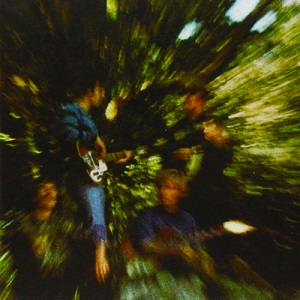
Bayou Country is the second studio album by American rock band Creedence Clearwater Revival, released by Fantasy Records in January 1969, and was the first of three albums CCR released in that year.
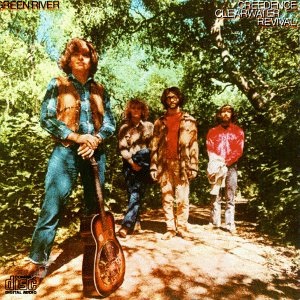
Green River is the third studio album by American rock and roll band Creedence Clearwater Revival, released in August 1969. It was the second of three albums they released in that year, preceded by Bayou Country in January and followed by Willy and the Poor Boys in November.
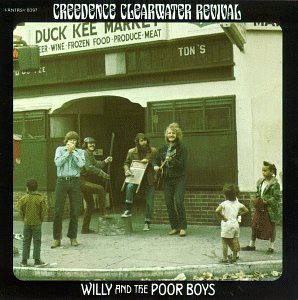
Willy and the Poor Boys is the fourth studio album by American rock band Creedence Clearwater Revival, released by Fantasy Records in November 1969. It was the last of three studio albums the band released that year, arriving just three months after Green River.

Pendulum is the sixth studio album by American rock band Creedence Clearwater Revival, released by Fantasy Records on December 9, 1970. It was the second studio album the band released that year, arriving five months after Cosmo's Factory.

Mardi Gras is the seventh and final studio album by American rock band Creedence Clearwater Revival, released on April 11, 1972. Recorded after the departure of guitarist Tom Fogerty, it was the band's only studio album as a trio, and featured songs written, sung, and produced by each of the remaining members, rather than just John Fogerty. The recording sessions were marred by personal and creative tensions, and the group disbanded after a short U.S. tour to support the album.
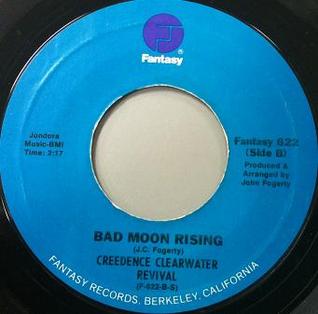
"Bad Moon Rising" is a song written by John Fogerty and performed by Creedence Clearwater Revival. It was the lead single from their album Green River and was released in April 1969, four months before the album. The song peaked at No. 2 on the Billboard Hot 100 chart on 28 June 1969 and reached No. 1 on the UK Singles Chart for three weeks in September of that year. It was CCR's second gold single.

Centerfield is the third solo studio album by musician John Fogerty. Released in 1985, it spawned the hit singles "The Old Man Down the Road", "Rock and Roll Girls" and the title track "Centerfield". This was Fogerty's first album in nine years; After Asylum Records rejected his Hoodoo album, he decided to take a long break from the music business because of legal battles with his record company. In the meantime, Fogerty's recording contract with Asylum Records was reassigned to co-owned Warner Bros. Records so this album was the first released on the Warner Bros. label.

The Long Road Home: The Ultimate John Fogerty/Creedence Collection is a compilation album by American roots rock singer-songwriter John Fogerty, released on November 1, 2005, by Fantasy Records. It compiles songs from Fogerty's solo career and his band Creedence Clearwater Revival. The title refers to Fogerty's return to Fantasy Records, after a lengthy stint with Warner Bros. Records and a brief stint with DreamWorks Records.

"Fortunate Son" is a song by the American rock band Creedence Clearwater Revival released on their fourth studio album, Willy and the Poor Boys in November 1969. It was previously released as a single, together with "Down on the Corner", in September 1969. It soon became an anti-war movement anthem and an expressive symbol of the counterculture's opposition to U.S. military involvement in the Vietnam War and solidarity with the soldiers fighting it. The song has been featured extensively in pop culture depictions of the Vietnam War and the anti-war movement.

The Concert is the second live album by American rock band Creedence Clearwater Revival, released by Fantasy Records in October 1980. It was recorded at the Oakland–Alameda County Coliseum Arena in Oakland, California, on January 31, 1970.

Chronicle, or fully Chronicle: The 20 Greatest Hits, is a greatest hits album by the American swamp rock band Creedence Clearwater Revival. It was released in January 1976 by Fantasy Records. The edited version of "I Heard It Through the Grapevine" featured on the album was simultaneously released as a single.
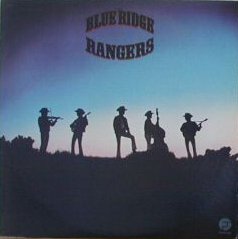
The Blue Ridge Rangers is the first solo studio album by John Fogerty, the former lead singer and lead guitarist of Creedence Clearwater Revival.

"Have You Ever Seen the Rain?" is a song written by John Fogerty and released as a single in 1971 from the album Pendulum (1970) by roots rock group Creedence Clearwater Revival. The song charted highest in Canada, reaching number 1 on the RPM 100 national singles chart in March 1971. In the U.S., in the same year it peaked at number 8 on the Billboard Hot 100 singles chart. On Cash Box pop chart, it peaked at number 3. In the UK, it reached number 36. It was the group's eighth gold-selling single.
Creedence Country is a compilation album by American rock band Creedence Clearwater Revival (CCR). It was released by Fantasy Records in October 1981 with the purpose of infiltrating the country market.
"Who'll Stop the Rain" is a song written by John Fogerty and originally recorded by Creedence Clearwater Revival for their 1970 album Cosmo's Factory. Backed with "Travelin' Band", it was one of three double-sided singles from that album to reach the top five on the Billboard Pop Singles chart and the first of two to reach the No. 2 spot on the American charts, alongside "Lookin' Out My Back Door". In 2004, Rolling Stone ranked it No. 188 on its "500 Greatest Songs of All Time" list.

"Green River" is a song by American rock band Creedence Clearwater Revival. It was written by John Fogerty and released as a single in July 1969, one month before the album of the same name was released. "Green River" peaked at number two for one week, behind "Sugar, Sugar" by The Archies, and was ranked by Billboard as the No. 31 song of 1969.


















